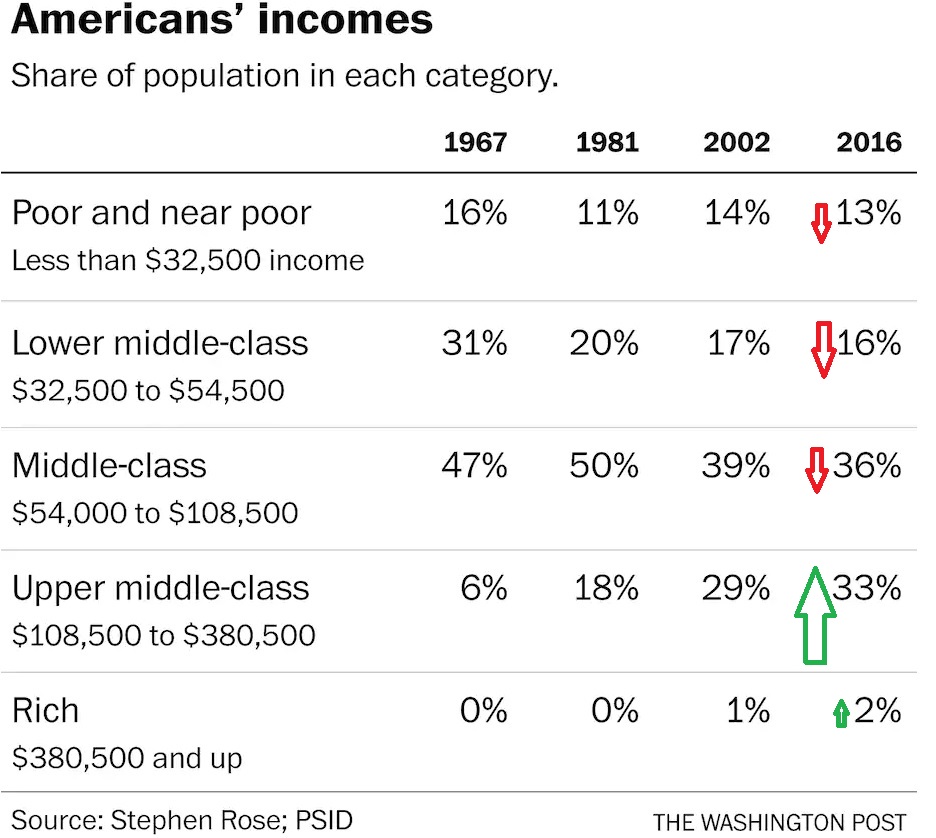In 2018, I shared a video from Professor Russ Roberts (a.k.a., @econtalker) on the economic status of the middle class, followed by a video last year on whether the rich are the only ones earning more income.
Today, we’ll look at his video on household income and mobility.
All of his videos are models of clarity, but nonetheless they require close attention because they are filled with so much useful information.
You’ll learn that some people manipulate numbers to paint a grim picture about economic mobility in America. But when you do honest apples-to-apples comparisons, you’ll see that capitalism is capable of delivering big benefits to ordinary people so long as it has enough breathing room to function.
you’ll see that capitalism is capable of delivering big benefits to ordinary people so long as it has enough breathing room to function.
In other words, we’re getting richer – as I wrote last year.
And, as I pointed out in an interview on CNBC, we should care about growth and opportunity instead of fretting whether some people get richer faster than other people get richer.
I’m writing on this topic today because there’s a new report from the Brookings Institution, authored by Stephen Rose, that looks at income trends. And it’s methodologically sound because it follows the same people over time, thus allowing the all-important apples-to-apples comparisons.
…the PSID panel data follow the experiences of the same respondents year after year. Even from one year to the next, many individuals’ incomes change significantly. This is particularly true at the tails of the distribution:
nearly one-third of individuals in the bottom and top income quintiles are there temporarily because of an unexpected positive or negative event (Rose 1994). Multiyear incomes are therefore more equal than single-year incomes. …Piketty and Saez…argue that middle-class incomes have been stagnating. But their cross-sectional approach does not reflect individual experiences because they are comparing “similarly-situated people” and not looking at the experiences of the same individuals over time.
And what does Professor Rose find?
He points out that there are now a lot more “upper middle class” people in America (his data are adjusted for inflation, which is another way of ensuring apples-to-apples comparisons).
…the higher income classes expanded significantly during the first period. Between 1967 and 1981, the upper middle class tripled in size (from 6% to 18%) and the MMC grew by 3 percentage points (from 47% to 50%). Offsetting these gains were a corresponding shrinkage of the lower middle class (LMC) from 31% to 20% and the poor/near-poor (PNP) from 16% to 11%. In the later period (2002 to 2016), the changes were in the same direction, but more modest. The upper middle class (UMC) grew by 4 percentage points, the size of the MMC declined by 3 points, while the shares of the LMC and PNP were largely unchanged. In previous work, I argued that the differences between the UMC and those with lower incomes were the key driver of rising inequality.
Since Brookings is a left-of-center think tank, it’s not a surprise that Rose has a somewhat negative interpretation (“rising inequality”) of this data.
But he’s actually giving us good news.
Robert Samuelson, in his column for the Washington Post, wrote about Professor Rose’s new study and put together a table based on his data.
And I’ve augmented the table with some arrows to call attention to what’s happened in the 50 years between 1967 and 2016. The bottom line that America now has fewer lower-income and middle-income people and a lot more upper-income people.
Perhaps it is true that we have more inequality today than we did in 1967, but only very twisted people (such as those who work for the IMF) would want to erase all the gains we’ve enjoyed since that time.
To be sure, all income groups could do even better with pro-growth policies such as tax reform and spending restraint. And we also could adopt policies that are especially beneficial for the less fortunate, such as school choice and licensing reform.
Sadly, the politicians who rant and rave about inequality are more interested in punishing the rich rather than helping the poor.
P.S. Margaret Thatcher debunked the left’s view of inequality in her farewell remarks to Parliament.
P.P.S. With apologies to Jonathan Swift, here’s David Azerrad’s “modest proposal” to end inequality.
———
Image credit: Vinicius Altava | Pexels License.


